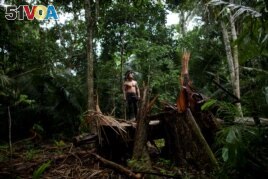28 April 2021
Brazil's Rondonia state is home to rainforests and at least three different native groups. The area has also faced serious problems like deforestation.
So when Brazilian reporter Gustavo Faleiros learned of an illegal attempt to take land away from a huge protected area in the state, he used his reporting skills to bring attention to it.
The Uru-eu-wau-wau Indigenous Reserve in Rondonia is spread over 18,000 square kilometers. It holds land used by many of Brazil's native or indigenous people.
"When I did the stories about the invasion of indigenous land, I felt it was really contributing to bring attention to that specific place," Faleiros said.
A grant from the Pulitzer Center's Rainforest Journalism Fund (RJF) permitted Faleiros to travel to Rondonia and report. The Pulitzer Center is an organization that gives financial support to journalists around the world. Faleiros' work was included in an RJF investigation into threats to the environment and indigenous communities in Latin America.
Faleiros now runs the Pulitzer's Rainforest Investigations Network. Reporters from several countries in the network work together to investigate issues like climate change and corruption.
The Pulitzer Center started RJF in 2018 to aid reporting on the Amazon Basin, the Congo Basin and Southeast Asia. The center plans to produce 200 environmental journalism stories through the RJF by 2023.
Nora Moraga-Lewy is the manager of the RJF. She said her group gives journalists the chance to report on stories that would not be written without its help. In addition to financial support, reporters are given training and access to a network of other journalists.
"At the Pulitzer Center we view journalism as a tool for empowering the public to engage in global issues and understand where their community fits in," Moraga-Lewy said.
Maraga-Lewy said the center's work brings attention to the threats facing rainforests and the forces that influence them over short and long periods of time. She added that the reporting seeks to find answers to problems that should have "more attention or support."
Strengthening local journalism is also an important part of RJF's work. The center does its best to find local reporters.
"Local journalism can help spread important information, share knowledge and build connections within communities" that help bring change, she said.
However, there are real difficulties with environmental reporting, Faleiros said. For example, it can be hard to get community members to talk. Falieros said people directly hurt by illegal forestry and mining are the most at risk from speaking to reporters.
"These are the guys who know a lot about the local context and can point out who is behind" the environmental problems, Faleiros said. Although it is very important to speak to local community members, if anyone is identified as a source, they can face serious actions. Talking with locals requires being honest with people and understanding why someone might not want to talk.

An indigenous man called Tebu, of Uru-eu-wau-wau tribe, looks on in an area deforested by invaders in the village of Alto Jaru, at the Uru-eu-wau-wau Indigenous Reservation near Campo Novo de Rondonia, Brazil February 1, 2019.
Reporting on rainforest destruction often means looking into corruption, organized crime, violence and human rights violations. When there is a risk of danger, Faleiros said the Pulitzer Center helps with security.
He has not been directly threatened himself, but he knows there are dangers. "Many of these rainforest countries are the ones with the biggest levels of violence, both for activists and journalists," he said.
Faleiros believes his reporting has brought good results for local communities. While not every project will lead to policy reforms, Faleiros believes RJF's work tells important stories about communities that are suffering.
Moraga-Lewy said RJF stories have gotten the attention of government officials. She said in all three areas were the group works, officials have taken some kind of action "where there had previously been inaction or silence."
I'm Mario Ritter, Jr.
Jessica Blatt wrote this story for Voice of America. Dan Novak adapted it for VOA Learning English. Mario Ritter, Jr. was the editor.
________________________________________________
Words in This Story
contribute-v. to give (something, such as money, goods, or time) to help a person, group, cause, or organization
grant-n. an amount of money that is given to someone by a government, a company, etc., to be used for a particular purpose (such as scientific research)
journalist-n. the activity or job of collecting, writing, and editing news stories for newspapers, magazines, television, or radio
access-n. a way of getting near, at, or to something or someone
reserve –n. an area of land where people, animals or plants are given special protection
empower -v. to give power to (someone)
engage- v. to get and keep (someone's attention, interest, etc.)
context–n. the situation in which something happens : the group of conditions that exist where and when something happens
source-n. someone or something that provides what is wanted or needed